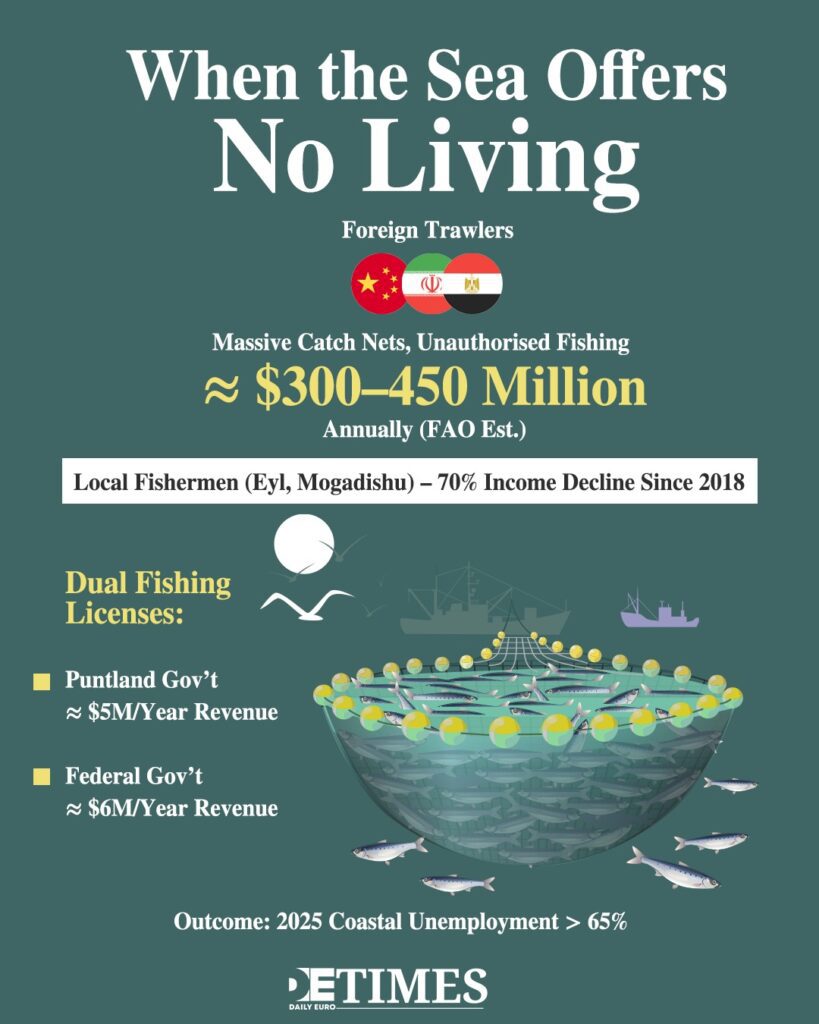Off the coast of Somalia, a disturbing scene occurred last week. Crew members were forced to lock themselves inside their ship as pirates attacked with rocket launchers and machine guns.
On November 6, pirates boarded the Maltese tanker Hellas Aphrodite, which was transporting gasoline from India to South Africa.
A Spanish frigate, the ESPS Victoria, eventually reached the tanker and scared the pirates away. It was one of several such incidents during the year, as piracy returns, shattering years of peace.
A Widening Security Gap on the Seas
The resurgence happens in a growing security vacuum. The African Union Transition Mission in Somalia is mandated to see Somali forces assume full security responsibilities by December 2024.
Local forces, however, struggle to manage ongoing threats without significant reinforcement.
At the same time, the international naval presence has thinned. Security analysts have noted its attention has been drawn northward to the Red Sea, leaving a void pirates now exploit.
The European Union’s Operation Atalanta now runs with a single Spanish Navy ship to cover a vast expanse of water.
With a reduced international presence, the security burden shifts. The Indian Navy recently freed the hijacked MV Ruen after it was held for several months, a sign of India’s growing role in the region.
Chaos on Land and in the Air
The instability at sea points to a fracture within Somalia.
On 8 November, Somaliland's President Abdirahman Irro declared full control over the breakaway region's airspace, ports, and airports.
The declaration introduced a maze of overlapping jurisdictions for airlines, which now navigate confusing rules from the governments in Mogadishu and Hargeisa.
Somaliland has even threatened to revoke landing rights for airlines, while Somalia’s central government does not recognize its visas.
Two different authorities are now claiming control over the same airspace, sometimes issuing conflicting instructions to pilots. While the territorial dispute plays out high in the air, pirates multiply in the waters below.
When the Sea Offers No Living
For many Somalis, the return of piracy is a source of fear and shame. Osman Abdi, a fisherman in Mogadishu, explained the attacks hurt the country’s reputation. His community and others along the coast are already in a desperate struggle.
A major cause of the desperation is rampant unauthorized fishing by foreign vessels, which harvest a high value of seafood from Somalia’s waters annually.
Fishermen from the town of Eyl reported earning a decent income a couple of years ago. Now, their livelihoods have vanished as foreign boats deplete the fish stocks.
The government’s own divisions worsen the situation, with the Puntland regional government and Somalia’s national government both issuing fishing licenses.
As local fishermen watch their catches dwindle while their governments profit, some see piracy as a viable option. For them, pirates are even perceived as a force fighting back against illegal fishing.

Diplomatic Wins and a Fraying Reality
On the world stage, Somalia has made progress. It recently gained admission to the East African Community and completed its debt relief process.
Somalia also won a seat on the UN Security Council for the 2025-2026 term, giving it a platform to advocate for its interests.
International milestones are set against a backdrop of daily struggles. Somalia simultaneously contends with a cybersecurity crisis after a catastrophic breach of its E-Visa platform exposed the personal files of thousands.
The breakdown in digital governance points to a lack of control over its own territorial waters. Symbolic victories abroad feel distant to coastal communities watching their resources stripped away.
A Sustainable Direction for the Seas
The Gulf of Aden is a main artery for global trade, with a large portion of the world’s shipping passing through it.
Recognizing its strategic position, Europe invested a large sum in Somalia from 2014 to 2022. Despite the investment, pirates are once again active.
Foreign warships offer a shield, but the drivers of piracy fester beneath the surface.
Agreements like the recent maritime security accord with Turkey, which gives Turkey a revenue share from Somalia’s waters in exchange for training, trade economic access for security.
Large amounts of aid cannot assemble a functional government. The international community’s interest in stable shipping lanes corresponds with Somalia’s need for strong institutions.
A genuine partnership would help Somalia build its own coast guard and implement sustainable fisheries management.
Foreign patrol ships will eventually leave, but local grievances are a permanent fixture until they are properly addressed.
Keep up with Daily Euro Times for more updates!
Read also:
Türkiye’s Oil Grab in Somalia: A New Era of Exploitation?
Democracy is Somaliland’s Greatest Threat as it is its Blessing
Tug of War: Centralisation Without Reward Brings the Fight Home






